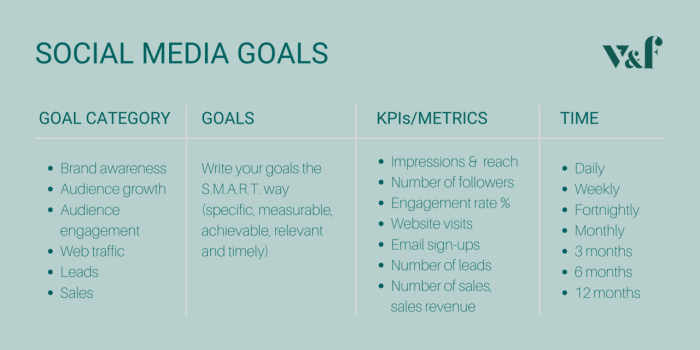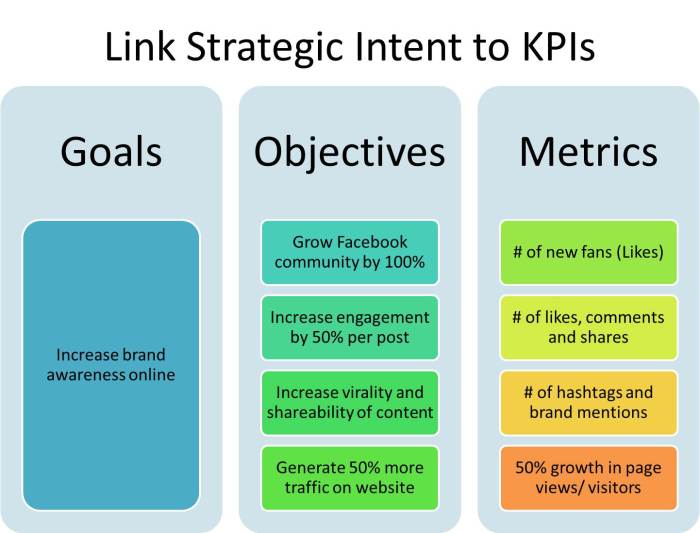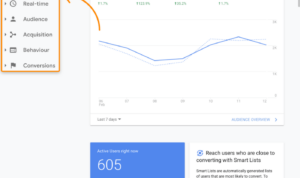Setting Social Media Goals kicks off the roadmap to online success, diving into the essential strategies and techniques to elevate your social media game.
From understanding the importance of clear objectives to measuring success metrics, this guide has got you covered.
Importance of Setting Social Media Goals
Setting social media goals is crucial for businesses to ensure that their efforts on platforms like Facebook, Instagram, and Twitter are purposeful and effective. By defining clear objectives, companies can align their social media strategies with overall business goals, track progress, and optimize their campaigns for success.
Examples of Specific Social Media Goals
- Increasing brand awareness: Companies may set a goal to grow their social media following, increase engagement with their posts, or reach a specific number of impressions to enhance brand visibility.
- Driving website traffic: Businesses often aim to direct users from social media platforms to their website, blog, or online store by sharing compelling content and calls-to-action.
- Generating leads and conversions: Some companies focus on capturing leads through social media campaigns, offering promotions, discounts, or exclusive content to encourage users to take action and make a purchase.
- Enhancing customer engagement: Companies may prioritize building relationships with their audience by responding to comments, messages, and reviews promptly, fostering loyalty and trust.
How Setting Clear Goals Helps in Measuring Success
Defining specific social media goals enables businesses to measure the effectiveness of their campaigns and track key performance indicators (KPIs) to evaluate their ROI. By analyzing metrics such as reach, engagement, clicks, conversions, and sentiment, companies can assess the impact of their social media efforts and make data-driven decisions to optimize their strategies for better results.
Types of Social Media Goals

When it comes to setting social media goals, it’s important to identify the different categories that can help guide your strategy. These categories include brand awareness, lead generation, customer engagement, and more.
Brand Awareness
- Increasing followers and reach on social media platforms.
- Creating a positive brand image through engaging content.
- Measuring brand mentions and social media sentiment.
Lead Generation
- Driving traffic to your website or landing pages.
- Converting social media followers into leads through targeted campaigns.
- Tracking lead generation metrics like click-through rates and conversions.
Customer Engagement
- Encouraging interactions and conversations with followers.
- Responding to comments and messages in a timely manner.
- Building relationships with customers through personalized content.
Short-term vs Long-term Goals

Short-term social media goals are focused on immediate results, such as increasing engagement or driving traffic. Long-term goals, on the other hand, aim to achieve sustained growth and brand loyalty over time.
SMART Goals for Social Media
Setting specific, measurable, achievable, relevant, and time-bound (SMART) goals can enhance social media strategies by providing a clear roadmap for success. By defining these parameters, you can track progress, adjust strategies as needed, and ultimately achieve your objectives efficiently.
Strategies for Setting Social Media Goals
Setting social media goals that align with your overall business objectives is crucial for success. By ensuring that your social media efforts support your broader goals, you can maximize the impact of your online presence and drive real business results.
Aligning Social Media Goals with Business Objectives, Setting Social Media Goals
When setting social media goals, it’s essential to first identify your company’s overarching objectives. Whether you aim to increase brand awareness, drive website traffic, or generate leads, your social media goals should directly contribute to these larger goals. For example, if your business objective is to boost sales, your social media goal might be to increase conversions through targeted advertising campaigns.
- Ensure that your social media goals are measurable and tied to specific business outcomes.
- Regularly review and adjust your goals to reflect changes in your business priorities.
- Track key performance indicators (KPIs) to monitor the success of your social media efforts.
Understanding the Target Audience
To set effective social media goals, you must have a deep understanding of your target audience. By knowing who your audience is, what they are interested in, and where they spend their time online, you can tailor your goals to resonate with them. For instance, if your target audience primarily uses Instagram, your social media goal might focus on increasing engagement on that platform.
- Conduct market research to gather insights about your target audience’s demographics, preferences, and behavior.
- Use analytics tools to track audience engagement and adjust your goals based on their feedback.
- Create buyer personas to better understand the needs and motivations of your target audience.
Setting Realistic Goals for Effective Campaigns
Setting realistic and achievable social media goals is key to the success of your campaigns. Unrealistic goals can lead to frustration and burnout, while realistic goals can motivate your team and drive continuous improvement. For example, instead of aiming to double your social media following overnight, set a goal to increase your following by a certain percentage each month.
- Break down larger goals into smaller, more manageable milestones to track progress over time.
- Consider past performance data and industry benchmarks when setting goals to ensure they are realistic.
- Celebrate small wins along the way to maintain momentum and keep your team motivated.
Measuring and Adjusting Social Media Goals
In order to determine the success of social media goals, it is essential to measure key metrics that provide valuable insights into the performance of your strategies. Analyzing data allows you to evaluate progress and make informed decisions on how to adjust your goals for optimal results.
Key Metrics for Measuring Social Media Goals
- Engagement Rate: This metric measures how actively your audience is interacting with your content through likes, comments, shares, and clicks.
- Reach: Indicates the number of unique users who have seen your content, giving you an idea of your potential audience size.
- Conversion Rate: Measures the percentage of users who completed a desired action, such as making a purchase or signing up for a newsletter.
- Click-Through Rate (CTR): Shows the percentage of users who clicked on a link within your content, indicating the effectiveness of your call-to-action.
Importance of Analyzing Data for Evaluating Progress
- Identifies what is working: Data analysis helps you identify which strategies are driving results and which ones may need to be adjusted.
- Provides insights into audience behavior: Understanding how your audience engages with your content can help you tailor your approach for better engagement.
- Allows for informed decision-making: By analyzing data, you can make data-driven decisions on how to adjust your social media goals for improved performance.
Strategies for Adjusting Social Media Goals
- Set realistic benchmarks: Establish clear benchmarks for success based on data analysis and adjust goals accordingly.
- Regularly review performance: Consistently monitor key metrics to track progress and identify areas for improvement.
- Experiment with different strategies: Test new approaches and tactics to see what resonates best with your audience and adjust goals based on the results.





